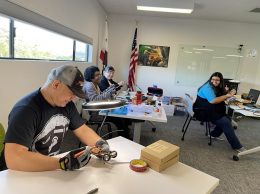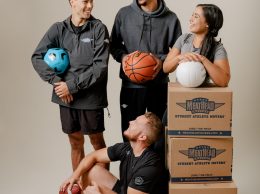Tri-county planning group helps companies pivot during pandemic
Long-term economic planning has taken a backseat to coronavirus mitigation measures, as business and economic development leaders have pivoted to meet immediate emergency needs.
For the newly renamed REACH 2030, formerly known as the Hourglass Project, that’s meant marshalling public-private partnerships to source and distribute N95 masks, sanitizer and other resources, often tapping companies that have seen production ebb during the shutdowns.
“We’re pivoting our focus to the immediate health and economic challenges facing communities with the COVID-19 situation,” said President and CEO Melissa James. “The landscape has changed quite a lot from what it was a few weeks ago.”
The nonprofit economic development think tank was created using settlement funding from the planned closure of the Diablo Canyon Nuclear Power Plant to develop an action plan to mitigate the economic impacts the shutdown would have for Northern Santa Barbara and San Luis Obispo counties.
In the wake of the outbreak, it put on hold efforts to spur a new space ecosystem at Vandenberg Air Force Base, among others, as it turned its attention to the new crisis, helping evaluate the region’s capacity to respond to a surge in COVID-19 patients. Vice President of Strategy Andrew Hackleman, a U.S. Air Force veteran and logistician, has also served in an advisory role for San Luis Obispo County.
Those efforts have taken shape as procurement teams for Central Coast manufacturers like Trust Automation were re-tasked to source 100 new ventilators for regional hospitals, James said, and plastics makers have switched to production of protective goggles for health care workers.
The benefits are twofold, she added, keeping tri-county employees working in the interim.
“It’s neat to see our business community looking at the challenge and finding solutions to it,” she said. “We’re all feeling the pressure and stepping up to meet the needs.”
Two examples of the partnership include Krobar Distillery and iFixit.
The Paso Robles distillery and its partner winery Grey Wolf transitioned their workers and equipment to the production of hand sanitizer, producing around 350 gallons for health care agencies, emergency responders and customers by press time March 25.
“We realized it wasn’t that hard to make sanitizer,” said co-owner and distiller Steve Kroener. “As long as you follow the guidelines and work with the equations, you can make it pretty quick.”
The company had been in the process of adding two new distilleries when state and county officials announced shelter-in-place restrictions.
“For the first three nights, I couldn’t sleep because I didn’t know how we were going to pay loan bills and pay rent,” Kroener said. “It was pretty scary at first.”
The company dedicated all of its equipment to the sanitizer production, but quickly ran into trouble locating raw materials for the products, including glass bottles with spray tops.
It’s provided bulk supplies for firefighters, hospitals, California Highway Patrol, homeless shelters, food banks and county sheriffs.
“We want to make sure they’re covered, they’re safe, so they can take care of us,” Kroener said.
Products range from 10 milliliter spray bottles that come free with an alcohol purchase to 750 ml bottles that sell for $27 apiece.
While the new venture keeps his employees working and covers much of the company’s costs, it’s a steep drop in margins for craft spirits, he said.
San Luis Obispo tech repair company iFixit has also shifted gears, putting its expertise to use to help hospitals maintain and repair critical equipment like ventilators.
“Repair across all disciplines is fundamentally the same, and manufacturers whether it’s Apple or Medtronic want to monopolize repair,” said founder and CEO Kyle Wiens. “Maybe that works in normal times,” he said, but now health care providers are “facing a much more accelerated need for equipment.”
The company has worked to publish hard-to-find service manuals for biomedical engineers and technicians, looking to earlier outbreaks in other countries like Italy for insight into which technologies are in highest demand.
Wiens said his team hopes to finish its work with ventilators by the end of the week and expand it to include respirators and anesthesia machines, which have ventilators built in and have frequently been redirected from operating rooms to intensive care units to support COVID-19 patients.
While the project doesn’t bring in revenue, it coincides with its advocacy efforts for right-to-repair laws that would expand access to the information, Wiens said.
“I’m extremely proud of our community and how people are transitioning from their normal work environment to this new COVID environment, and like us have transitioned their equipment and their businesses to keep the economy going,” Kroener said.
• Contact Marissa Nall at [email protected].












